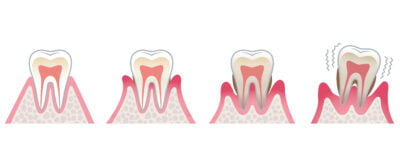 Did you know that it’s possible for your teeth to last a lifetime? Although dental technology has advanced leaps and bounds over the years, there is no substitute for your own, natural teeth. One way to make sure your teeth last as long you do is to avoid periodontal disease – or as it’s more commonly known, gum disease.
Did you know that it’s possible for your teeth to last a lifetime? Although dental technology has advanced leaps and bounds over the years, there is no substitute for your own, natural teeth. One way to make sure your teeth last as long you do is to avoid periodontal disease – or as it’s more commonly known, gum disease.
Causes
Gum disease begins with plaque – that sticky film of bacteria that forms on your teeth. Brushing and flossing removes plaque, but it reappears quickly – usually within 24 hours. If plaque stays on your teeth for more than a few days, it eventually hardens and turns into tartar, or calculus. Tartar actually provides a reservoir for bacteria, making plaque more difficult to remove.
The longer plaque and tartar sit on your teeth, the more damage they do. First, they irritate part of your gums (called the gingiva), causing inflammation. This is what we call gingivitis. But as inflammation continues, pockets will eventually form between your teeth and gums. Plaque, tartar and bacterial fill these pockets, which continue to deepen and collect more and more bacteria.
As the infection progresses, it eventually advances under the gum tissue, leading to tissue and bone loss. If continued to be left untreated, the condition leads to tooth loss.
Signs and Symptoms
It’s important to know that some patients suffer periodontal (gum) disease without demonstrating obvious symptoms. However, you should look out for the following:
- Bleeding gums: Brushing should never cause bleeding. If your gums bleed when you brush, this is a warning sign of gum disease.
- Bad breath: As plaque collects between your teeth and gums, it creates the perfect home for bacteria to collect and lead to this embarrassing problem.
- Red or swelling gums: Beware of inflammation of the gums, an early sign of gum disease.
- Receding gums: If more and more of your teeth are being exposed, your gum may be slowly wearing away.
- Sensitivity: As tooth roots are exposed (due to receding gums), they become sensitive to hot and cold.
- Periodontal abscess: As bacterial becomes trapped in a periodontal pocket, it may fill with pus, leading to swelling and pain.
- Loose teeth: As gum disease advances, it will inevitably lead to bone loss. This will cause teeth to loosen or move within the mouth.
What to Do
There is no such thing as an at-home treatment to eliminate gum disease. If you notice any of the above symptoms, or otherwise suspect that you may be suffering from gum disease, it is important that you see your dentist right away.
Call the Yuba City Dentistry Group today and we will be happy to schedule an appointment as soon as possible.


